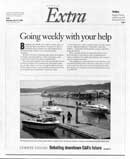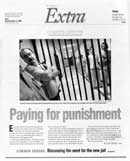Summer 2000
Extra: Getting a Handle on Civic Journalism
By Pat Ford
Pew Center

An hour and a half till deadline and Idaho Interactive Editor Ken Sands of The Spokesman-Review is still waiting to hear from the writers of his lead story about a major development project in Coeur d’Alene. They’ve had a week to write their stories and yet, here he is, sweating bullets, watching the clock.
But Sands is philosophical about it. After all, his writers are also the project’s developer and the government official who may help fund it so they are probably busy, he figures. And, if worse comes to worse, he can always run the dozens of letters from readers who’ve written in about the project.
Such are the struggles and successes Sands faces editing “Handle Extra”, a tabloid insert built on civic journalism with most of the content provided by non-journalist members of the community.
The community is Kootenai County in the panhandle (or just plain handle) of Idaho, hence the section’s name. Contributors include residents, officials, high school students, retirees, clergy – actually, anyone who has a mind to say something. Nearly one whole page is devoted to letters. There are regular columns, guest columns, specially commissioned columns, Q&A’s with local residents – oh, and the occasional staff-written story, usually suggested by a reader.
“We’re trying to see if we can incorporate a lot of what we’ve learned about civic journalism in a section,” says Chris Peck, editor of The Spokesman-Review.
The Spokesman-Review was one of the first papers in the country to create the position of “interactive editor” to bring readers into a closer relationship with the paper. It has incorporated civic journalism techniques widely in its news and editorial pages and even published a “how to” book of its civic journalism experience for other papers who want to begin or expand their own efforts.
“Handle Extra” presented an opportunity to build an entire section based on civic journalism; not just a portion of a section and not a series of projects but an ongoing commitment to use the tools of civic journalism on every page.
Getting Readers Involved
“Our goal is to deliver a publication that strengthens the relationships between Kootenai County residents, your community and the newspaper,” wrote Sands in the “Extra’s” first edition. “We hope to do this by inspiring greater citizen participation in solving community problems and by encouraging reader involvement in nearly every aspect of ‘Handle Extra’.”
Sands is the only full-time staff member working on “Handle Extra” and, though he praises Peck for conceiving the idea and managing editor Scott Sines for supporting it, Sands is very much the section’s driving force.
Sands began beefing up the civic content of the paper’s Idaho edition as soon as he became interactive editor in 1998. One of the first things he did was to build a database of Idaho readers using the paper’s e-mail system. He would skim letters to the editor for Idaho addresses and add the writers’ e-mail addresses to his database. He would check The Spokesman-Review’s online forums for people writing about Idaho issues. He would have reporters gather e-mail addresses while working on stories. He has built a database of nearly 700 addresses and he regularly sends the group e-mails asking for input about issues the paper is reporting on.
So Sands was in a good position to find readers to contribute when he launched “Handle Extra” in April. He signed on as regular columnists men and women he knew to be leaders in their communities. One, Kerri Thoreson, a self-described “flak” for the Post Falls Chamber of Commerce, writes her column every week.
“I really appreciate what they’re trying to accomplish,” says Thoreson. “They’re trying to create that sense of community that a local weekly can create and take it to the next level.”
Sands is particularly proud of “Common Ground,” a recurring feature. Each month, he solicits the views of opposing sides on an important local issue and tries to find in those views the common ground that can move the stakeholders toward a solution.
In May, “Common Ground” focused on funding for a new county jail. First, Sands sent e-mail to the readers in his database soliciting questions they had about the issue. He then put eight of those questions to the key players in the debate. The package included mug shots and short bios from an entire day of bookings at the county jail and a guest column from a deputy who works there.
Having an Impact

Ten days later, voters approved, 61-39, a tax increase to fund a new jail. That was a turnaround from a year earlier when the proposal failed. Did “Handle Extra” influence the outcome? Sands believes it may have.
“I heard from so many people that they read it and they were really shocked by the mug shots from the day of bookings,” he says. “That sort of visceral reaction to these 24 unsavory characters in the midst of the community might have helped to push it over the top.”
Sands says his biggest problem may be too much success. He originally envisioned a section of 16-20 pages but advertising sales have been so brisk, the sections have routinely been more than 20 pages and often 32 pages. It is a challenge to fill that space every week with community contributors and he says he may have to rethink the staffing. But even if there are more staff-generated stories, he wants to keep the community-oriented focus.
For instance, he has just added a new feature called “Tributes,” which is a feature-length obituary about a community member.
“This is an experiment,” says Sands. “It’s an experiment that’s working.”
